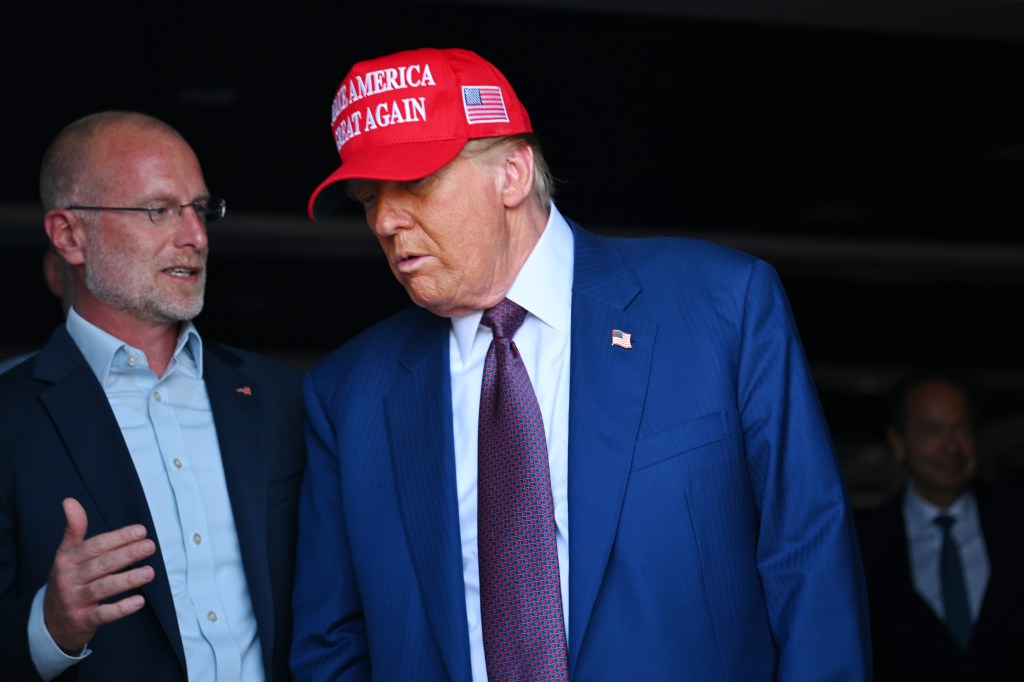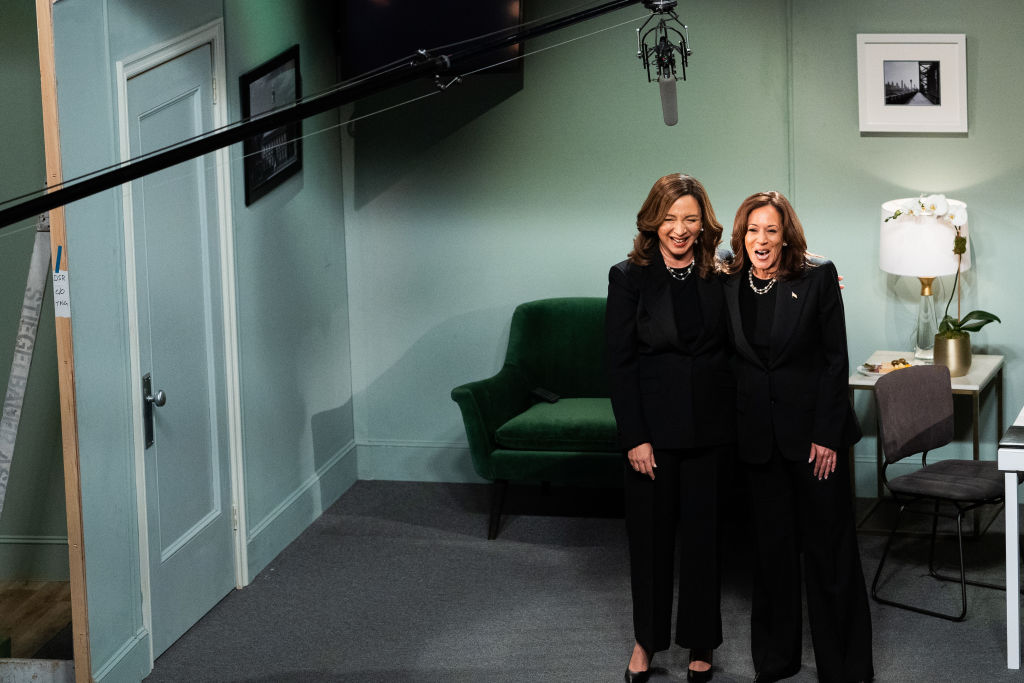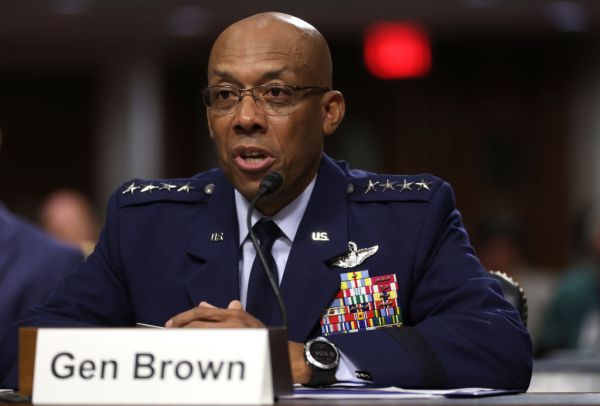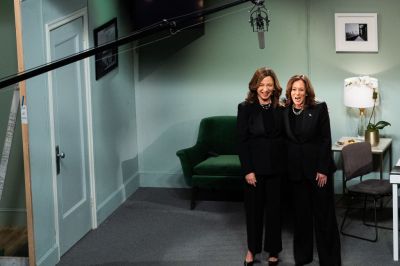In the waning weeks of the 2024 presidential campaign, President Donald Trump returned to one of his most common targets of criticism: broadcast news organizations. Following a 60 Minutes interview with Vice President Kamala Harris, Trump called for CBS to lose its license over how the program cut the interview, claiming “THE BIGGEST SCANDAL IN BROADCAST HISTORY.”
Going back to his first administration, the president has a history of calling for the government to pull the licenses of broadcasters he dislikes. In October 2017, Trump trained his fire at NBC, prompting Federal Communications Commission (FCC) Chair Ajit Pai—a Republican commissioner that Trump made chair—to publicly rebuff the president. “Under the law the FCC does not have the authority to revoke a license of a broadcast station based on the content of a particular newscast,” Pai said at the time.
But a month into Trump’s second term, his new FCC chair appears content to use the independent regulatory agency as an instrument rather than a buffer for the president’s campaign against broadcasters, drawing criticism from fellow commissioners and First Amendment advocates.
Last month, FCC Chair Brendan Carr reinstated complaints against TV stations owned by CBS, ABC, and NBC that the commission had previously dismissed. The Center for American Rights (CAR)—a conservative legal group that has pursued a number of legal actions aligned with the president’s views—filed each of the complaints, alleging the networks violated the federal equal air time statute for political candidates and the FCC’s policy on news distortion. The FCC, a five-member commission appointed by the president that must include members of both parties, does not have authority to regulate news networks directly, only individual broadcast TV stations, a portion of which are owned by the networks.
Current and former FCC officials and staff argue the reinstatements run counter to the agency’s policy and raise alarms about the potential chilling effects on speech. “This is a retaliatory move by the government against broadcasters whose content or coverage is perceived to be unfavorable,” Democratic Commissioner Anna Gomez said in a statement last month. “It is designed to instill fear in broadcast stations and influence a network’s editorial decisions.”
The NBC complaint concerned a Saturday Night Live (SNL) appearance by Harris days before the 2024 election that CAR claimed violated the equal time provision of the Communications Act requiring that if a broadcast station allows a candidate some air time, it must also provide “equal opportunities to all other such candidates for that office.” Directly after the appearance, WNBC, the NBC-owned station that aired the broadcast, filed a public notice, which is the required process for broadcasters to offer opportunities to other candidates once one candidate has made an appearance. On the following day, NBC’s stations aired a Trump message equivalent to the time Harris appeared on SNL.
The FCC subsequently dismissed the complaint, stating that “[u]nder our rules, NBC is not obligated to provide exactly the same access; in the context of a live comedy show, such an accommodation would be impossible.”
At the time, Carr argued that NBC’s actions were structured “to evade” the rules. SNL executive producer Lorne Michaels had previously said that neither Trump nor Harris would appear on the show because of the equal time requirements.
The CBS and ABC complaints cite the FCC’s policy on news distortion. The filings echo Trump’s criticisms of the Harris 60 Minutes interview and his gripes with how ABC’s moderators fact-checked his remarks during the September presidential debate between him and Harris. Earlier this month, Carr requested CBS share the full video and transcript of the 60 Minutes interview and the network complied, releasing a statement saying the full materials show the editing of the Harris interview “was not doctored or deceitful.”
What exactly is “news distortion,” according to the FCC? The agency created the news distortion policy in the 1960s ostensibly under the Communications Act’s directive to regulate the airwaves in the benefit of the public interest. But the FCC doesn’t consider biased or even inaccurate news programming to be violations of this policy. Rather, it applies only when broadcast news is knowingly false or intentionally staged. For example, in 1992, a Dateline NBC report on the safety of General Motors vehicles’ gas tanks included a test crash the program conducted that purported to demonstrate the risk of a GM truck exploding when involved in a car accident. But the broadcast failed to disclose that test conductors had rigged the truck with model rocket engines to ensure an explosion.
In its previous dismissals of the complaints against the networks, the commission concluded the evidence for those complaints came nowhere near the level required to justify a news distortion action. “It is not sufficient for the complainant to show that the material in question is false or even that the licensee might have known or should have known about the falsity of the material,” the agency said in its dismissal of the CBS complaint. “A news distortion complaint must include extrinsic evidence that the licensee took actions to engage in a deliberate and intentional falsification of the news.” Similarly, in the ABC dismissal, the agency said, “The complaint relies almost entirely on allegations of an editorial nature and conclusory statements—without extrinsic evidence of intentional malfeasance—and fails to meet the high threshold for opening a ‘news distortion’ matter.”
In all three orders reinstating the complaints, the FCC did not cite or reference any new evidence or outline how the FCC’s thresholds for news distortion inquiries had been met. Instead, the brief orders said only that the dismissals were “issued prematurely based on an insufficient investigatory record.”
Robert Corn-Revere, First Amendment lawyer“For the FCC to not just investigate but to reopen closed investigations for the purpose of going after those networks really smacks of political abuse of the office.”
Robert Corn-Revere—chief counsel at the Foundation for Individual Rights and Expression who previously served as chief counsel to former FCC Acting Chair James Quello—told The Dispatch, “I have never seen a complaint be reinstated in this way.”
What’s particularly concerning, Corn-Revere argued, is that the scrutiny is targeted at networks Trump has disagreed with, one of which he’s actively suing. “For the FCC to not just investigate but to reopen closed investigations for the purpose of going after those networks really smacks of political abuse of the office,” he said. “Even if the FCC had the authority that Carr seems to imagine that it does—and it doesn’t—trying to do this to go after political opponents or perceived political opponents, is plainly unconstitutional.” Notably, Carr did not reinstate a fourth complaint the FCC dismissed at the same time as the other three; the fourth complaint was brought by a progressive advocacy group against a broadcast station owned by Fox.
The news distortion rule has had a troubled record since its inception, historian and media researcher Paul Matzko told The Dispatch. “It was actively rooted in an effort to censor embarrassing, politically inconvenient news information,” he said. The policy arose in response to lawmakers filing complaints about news coverage they disliked, including Democrats irked by the coverage of the police response to protests at the 1968 Democratic National Convention. “There was no good-faith news distortion standard at its root,” Matzko argued.
Part of why the FCC’s policy on news distortion has been historically so narrow and rarely invoked lies in the fact that it is not established explicitly in law. Harold Furtchtgott-Roth, a former Republican FCC commissioner appointed by President Bill Clinton, told The Dispatch that news distortion is not a statutory concept. “It is something the commission has created over time,” he said. “It’s also not in the code of federal regulations.”
Research by Chad Raphael, a media and communications scholar at Santa Clara University, found that between 1969 and 1999 the FCC made 120 decisions in news distortion complaint cases, ruling against broadcasters in just 12 instances. Licenses were revoked in only three of the cases, which also involved a number of separate issues considered by the FCC such as bribery, illegal campaign contributions, and employee intimidation. Even in the case of the manufactured GM truck explosion, the FCC only sent a letter of admonishment to NBC, which separately settled a defamation suit brought by GM.
What’s perplexing to some observers is how the recent reinstatements seem to conflict with Carr’s previous positions on the government’s limited role in regulating news broadcasts. In October, he affirmed news distortion is a “very, very narrow rule” and said that “in one case out of a million is there any legitimacy to a [news distortion] claim.” Referencing the 60 Minutes interview specifically, he said, “In this particular case, I don’t think this should be a federal case.”
“Release the transcript, and there’s no reason to even have this before the FCC at that point,” he added.

But following the release of the video and transcript, Carr, instead of closing the case, established an agency docket on the complaint to solicit public comment. It’s unclear on what evidentiary basis the CBS inquiry, or the ABC and NBC inquiries, remain ongoing. Carr said in an interview released Monday that he was following the precedent of the Fox case by seeking public comment on the complaints.
“It’s sort of an odd posture to have some people pushing hard for the FCC to revoke Fox’s license and then have serious issues with the FCC applying the exact same precedent that they pushed for in an even-handed manner,” he said. He added that the Biden administration weaponized the government against people like Elon Musk while favoring people like George Soros and that the new administration is “returning to an even-handed treatment for everybody.”
Corn-Revere and Matzko both said if the FCC moved to penalize the broadcast license holders based on the complaints, it’s unlikely they would survive a court challenge. Although Carr has signaled he’d like to “reinvigorate” the FCC’s regulation of broadcast licenses using an expanded interpretation of “public interest,” such a move would likely face an uphill battle in light of the Supreme Court’s decision in Loper Bright Enterprises v. Raimondo, which curtailed agencies’ power to interpret the law.
But penalties or license revocations might not be the most immediate result of the FCC scrutiny. CBS’ parent company, Paramount Global, is being acquired by Skydance Media, and the FCC has to approve the transfer of broadcast licenses involved in the transaction. In November, Carr said that the CBS news distortion complaint “is likely to arise in the context of the FCC review of that transaction.”
Trump’s lawsuit against CBS cites Carr and the news distortion complaint. Two days after Carr opened a docket on the complaint, Trump doubled the damages he’s seeking to $20 billion and added Paramount Global to the suit. Paramount is now considering settling the Trump lawsuit as a way to secure the FCC’s approval of the license transfers, but the company’s executives are reportedly concerned that settling could expose them to potential bribery charges or shareholder litigation.
“The power of the FCC chairman to interpret the vague public interest doctrine invites its politicization,” former FCC Commissioner Tom Wheeler argued last week, “and in the case of the Trump lawsuit, its potential for abuse in private matters.” To complete the intertwining of public and private interests, Trump issued an executive order February 18 asserting the executive branch’s control over independent regulatory agencies like the FCC.
The administration’s targeting of news broadcasters stands in contrast to comments Carr made in 2021, when he condemned the efforts of Democratic lawmakers to press media companies to drop right-wing news outlets such as Newsmax, Fox News, and One America News Network.
“The Democrats are sending a message that is as clear as it is troubling—these regulated entities will pay a price if the targeted newsrooms do not conform to Democrats’ preferred political narratives,” Carr said at the time. “A newsroom’s decision about what stories to cover and how to frame them should be beyond the reach of any government official, not targeted by them.”







Please note that we at The Dispatch hold ourselves, our work, and our commenters to a higher standard than other places on the internet. We welcome comments that foster genuine debate or discussion—including comments critical of us or our work—but responses that include ad hominem attacks on fellow Dispatch members or are intended to stoke fear and anger may be moderated.
With your membership, you only have the ability to comment on The Morning Dispatch articles. Consider upgrading to join the conversation everywhere.